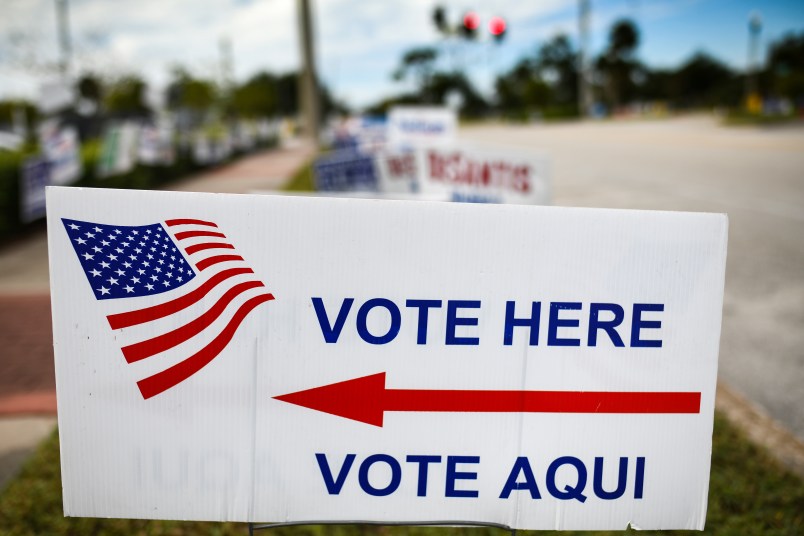DES MOINES, Iowa (AP) — The Iowa Democratic Party on Monday proposed the biggest changes to the state’s famed caucuses in nearly 50 years by recommending Iowans be able to participate virtually.
If approved, the measure would allow people to caucus using telephones or smart devices during the days leading up to the Feb. 3 caucus night.
It’s a dramatic shift from the current system in which caucusgoers have to physically show up at a site — often a school, church or community center— and show their support for presidential candidates by standing in groups. If the group doesn’t meet an established threshold, the participants have to select another candidate.
It’s an often chaotic process that plays out before banks of television cameras on an evening that formally ushers in the presidential primary season. But proponents say it will help address criticism that the caucuses are difficult to attend for single parents, people who work at night and the elderly.
“Through this additional process we’re going to be able to give more Iowans a chance to participate in this process,” Iowa Democratic Party Chairman Troy Price said.
“Whether someone is a shift worker, a single parent, in the military, living overseas or experiencing mobility issues, this process will now give these individuals a voice in selecting the next president of the United States.”
And while Price says the proposed changes are the state party’s effort to open the process often described by critics as antiquated, it was also required by the Democratic National Committee. The results are Iowa Democrats’ attempt at threading the needle of complying while maintaining the essence of the caucuses, which are real-time meetings of fellow partisans.
Presidential candidates are already beginning to swarm the state — three were here this weekend. They’ll likely try to determine whether a virtual caucus would help them turn out more of their supporters.
“I suspect presidential campaigns who we’ve shared this information with are going to be trying to figure out how to get their members to participate in this,” Price added.
Party officials said they didn’t know how many people would take advantage of the new format or how campaigns might seek to capitalize on it.
A key element of the proposal, which now goes before Iowa Democrats to comment on for 30 days, is that, no matter how many Iowans participate virtually, their contribution will be factored as a flat 10 percent of the total turnout, apportioned by congressional district. Price said officials reached 10 percent as a starting point, uncertain of how many people might join virtually.
“This is a new system so we don’t have any data to tell if this number is too high or too low,” Price said. “And so we are starting the conversation at the 10 percent threshold, and if it goes gangbusters this year, then we will have conversations in subsequent years about if we need to make adjustments.”
Hillary Clinton, the 2016 Democratic presidential nominee who narrowly beat Vermont Sen. Bernie Sanders in Iowa that year, criticized the caucus process for deterring late-shift workers and others less able to steal away for an evening of political wrangling.
“Campaigns must decide how to organize for that 10 percent,” said veteran Iowa Democratic caucus operative Jeff Link, who did not work for Clinton in 2016 and is not affiliated with a candidate heading into 2020.
In another noteworthy development, the state party said it would release the raw data of preferences by caucusgoers, information that is typically kept confidential. The caucuses are a series of preference tests in which candidates without a certain level of support are rendered unviable. This data would give a first glimpse of the candidates’ support before caucusgoers abandon their first choices to side with more viable contenders.
The Iowa caucuses are scheduled for February 3, 2020. The proposal won’t be finalized until the spring.







‘“Virtual” caucus where you can change your vote from candidates below a threshold to a viable candidate of your choice’ == ranked preference balloting as used is Australia (that also allows a secret ballot). Dump the quaint archaic caucusing and bring in a democracy-promoting system.
How about changing it to a closed primary instead? I am fed up with the antiquated caucus bullshit.
Yeah, whenever I think of caucuses I always think of “floaters”.
I don’t want Independents or Republican interlopers allowed in a Dem primary system, and I don’t give a flying fuck what Bernie and his acolytes want. Let them have their own goddamned primaries. To hell with this caucus bullshit!
Hope they have excellent security around this. Otherwise Russia will be choosing for Iowa.
I participated in Iowa’s first caucus… one thing I will note, there were a lot of people who refused to take part because they feared their Republican boss might fire them.
Much too exposed a process, it discourages participation simply in that it openly reveals a person’s politics and in many places, that means a Republican boss and Democratic employees, Iowa in particular.
Here in Kansas, ever since it started, that effect has dampened turnout since day one. I was county chair in 2012 and ran the Dem caucus, and it was obvious many of our members refused to expose themselves to that public scrutiny for that very reason.
There’s a reason ballots are secret.